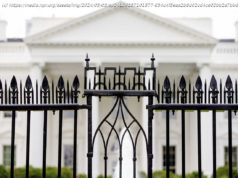With the U. S. trying to step out of some of the most important issues at the summit, the German Chancellor was forced to play negotiator and host.
World leaders wrapped up the Group of 20 (G20) summit on Saturday by releasing their final statement, a communique that was remarkable this year in that it singled out the U. S. withdrawal from the Paris climate agreement. President Trump’s decision, which he announced in June, dragged out the negotiations well into Saturday. At a press conference that marked the meetings’ end, German Chancellor Angela Merkel, who hosted the summit in Hamburg, said she “deplored” the U. S. exit from the agreement.
The final statement read: “We take note of the decision of the United States of America to withdraw from the Paris agreement, ” but it also added a stern reminder that all other G20 members had reaffirmed the agreement as “irreversible.” In refusing to support the climate agreement, America is now the only country not signed onto the deal except for Syria, which is in the midst of a civil war, and Nicaragua, which believed the agreement wasn’ t strong enough.
“Nothing’s easy, ” Trump said of how the negotiations played out.
Merkel did most of the hard work in bridging the gap between the U. S. and 19 other countries at the meeting. She hosted the summit in her birthplace, and she’ d hoped it would boost her fourth-term reelection campaign ahead the vote in September, with her playing the central role as unifier. But media attention at the meeting was mostly diverted. Locally, press was distracted with violent protest held by anti-capitalists that shut down much of downtown Hamburg. Internationally, most of the focus was on Trump, whether it was his meetings with world leaders, or with his policies on migration, free trade, and pulling out of the Paris climate agreement. Still, Merkel emerged as a pivotal agent for compromise.
A day earlier, Trump held his first face-to-face meeting with Russian President Vladimir Putin. Trump has expressed his admiration for the leader, but Putin and Russian interference in the 2016 presidential election has been a constant scandal for the White House. Still, their meeting ran much longer than the 20 minutes scheduled, well over two hours. It was a clear highlight of the summit, despite the relatively unsatisfying recaps of it offered by both governments.
Even during what should have been less high-profile moments at the meeting, the Trump family seemed to steal the show. At a meeting Saturday on African migration and health, Trump stepped away momentarily to talk with the leader of Indonesia and his daughter Ivanka took his seat. A photo of the moment was tweeted (and later deleted) showing Ivanka seated beside British Prime Minister Theresa May and Chinese President Xi Jingping. ” Ivanka is an adviser to her father, and Trump has brought much of his family into roles at the White House, but some people still criticized the moment—some jokingly pointing out that Ivanka, two weeks before, said she preferred to “stay out of politics.” Michael McFaul, who was United States ambassador to Russia under President Barack Obama, called the moment “strange. Very strange. Others brushed the moment off. Asked if it was unusual, Merkel told reporters that Ivanka was “part of the American delegation, so that is something that other delegations also do, and it is very well known that she works in the White House and that she is also engaged in certain initiatives.”
Ivanka also came away from the summit with $50 million in aid, given by the U. S. State Department, for a new World Bank fund that helps women entrepreneurs start businesses. Ivanka helped create the fund, along with World Bank President Jim Yong Kim. This comes as Trump has ordered massive cuts to the State Department’s foreign aid funds in exchange for policies that focus on his “America First” policies.
Another focus of the summit were Trump’s views on trade deals. Previous G20 statements called for world leaders to denounce protectionism, and while the communique is mostly symbolic, this phrase has taken a more important role after the global financial crisis. Trump often criticizes trade deals, and the meeting’s final statement included language that said trade deals must be “reciprocal and mutually advantageous” or else countries could use “legitimate trade defense instruments.” The G20 language already allows countries to take defensive measures, and Merkel said the final language would not change anything. She did, however, single out the trade negotiation as “extraordinarily difficult… due to specific positions that the United States has taken.” She called the final language of the statement a win.
It read, in part: “We will keep markets open noting the importance of reciprocal and mutually advantageous trade and investment frameworks and the principle of nondiscrimination, and continue to fight protectionism including all unfair trade practices and recognize the role of legitimate trade defense instruments in this regard.”
Despite the U. S. pushback, and the media’s attention on Trump, the meeting was largely seen as a win for Merkel. The summit is meant to draw lines around common ground and interests, and with the U. S. trying to step out on some of the most important issues, Merkel played the role of the patient wrangler. After France raised objections to allowing the U. S. to be singled out of the climate agreement, she was credited with reaching a compromise. Even Trump was greatly impressed with Merkel’s work. “You have been amazing, ” Trump said, “and you have done a fantastic job. And thank you very much, Chancellor. Incredible.”
The two even made time to make up for the handshake they missed when Merkel last visited the White House.






